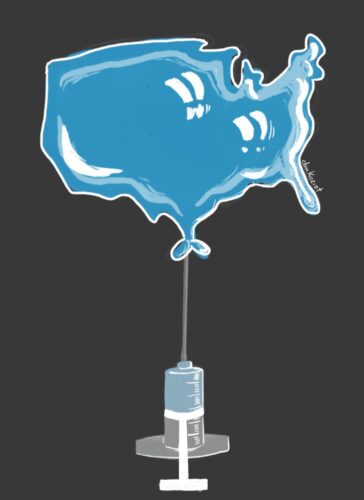Vaccine Eligibility and How Able-Bodied People are Cheating it
By Ava Cohen
Gov. Gavin Newsom announced late in March that everyone in California will be vaccinated by the end of April in hopes of opening the state back up by June 15, and President Joe Biden has made the valiant claim that everyone in the U.S. will be vaccinated by May 1.
California is on schedule to make vaccines available to all residents ages 16 and older on April 15. Some counties have varying tiers of who is eligible at certain times and some counties have already made them available to all. In San Francisco, people 50 years and older, healthcare workers, people working in certain essential service roles, people with certain health conditions or disabilities, people experiencing homelessness, and people living in congregated settings are currently eligible for the vaccine. San Francisco County has also included HIV as a valid underlying health condition to receive the vaccine.
Another article from San Francisco Chronicle says that public transit workers and incarcerated residents are also currently eligible for the vaccine. Although I am typically very wary of San Francisco’s neoliberal facade, I am incredibly glad to hear that both incarcerated residents and homeless people are eligible (though I do believe they should’ve been a higher priority on the tiers) considering they are some of the most vulnerable to the virus and most commonly disregarded.
However, some communities should’ve prioritized those who weren’t. For a city that has a reputation for being so sex-positive, we haven’t done an adequate job of protecting some of the most vulnerable workers.
Sex workers are incredibly susceptible to COVID-19, particularly those who work in close contact with people. Fortunately, a peer-based organization for the health and safety of sex workers, St. James Infirmary, has been able to give doses of the vaccine to sex workers, but in limited supply.
People with disabilities that make them more at risk of contracting or dying from COVID-19 also should’ve been prioritized in the earlier rollout tier than March 15; truthfully they should’ve been part of the first priority tier, along with people over 65. According to the San Francisco Human Services Agency, one in ten San Franciscans has a disability, and 27% of those people have to take public transportation.
As an essential worker, I had a horrendous time finding an appointment earlier in the rollout stages, and witnessed several cases of peers, or even older adults, cheating their way to the front of the line when they were not yet eligible. It’s been quite frustrating, to say the least, particularly because a lot of the people I’ve noticed cutting the lines have been able-bodied people with easy access to healthcare if they did contract COVID-19.

I understand that most everyone’s been wildly disconcerted throughout the pandemic, which is completely valid, but working-class people and others who are more vulnerable to the virus should not have to suffer the consequences of the anxieties of able-bodied people who don’t have to worry about access to healthcare and resources. It’s ironic how some of the very people who complained about people partying during the pandemic are adopting the same American “me first” attitude when it comes to getting vaccinated.
A perfect example of this is One Medical and its recent scandal. The healthcare provider is under investigation for allowing an influx of wealthy clients to cut the lines and receive the vaccine, regardless of eligibility.
But from my experience and others I’ve spoken to, huge vaccine sites such as the Moscone Center have not been asking for verification either. In fact, I don’t think I’ve spoken to anyone who had to give verification of eligibility at any site.
Although in some regards, I wish they would be more diligent with this, I realize there’s a lot of pressure to roll this vaccine out to as many people as possible, and from my understanding, there wasn’t much guidance given as to how to verify eligibility. It’s difficult to navigate because some groups have been cheated out of the eligibility rollout tiers, while the main people who seem to be cutting the lines are at lower risk.
That self-centered attitude is so deeply ingrained in our culture, and I think (or at least I hope) that things might have gone differently had we had a more capable and efficient government dealing with this pandemic, referring to our last president, whose handling of the situation spurred anxiety levels for everyone. Not just that, but the fact that it is the first global pandemic any of us have experienced was bound to cause consternation.
However you look at this situation, there isn’t particularly one “right” way to do it. My biggest hope is that whatever the outcome of this pandemic, we will emerge with a renewed consideration for others and to look out for each other however possible.
